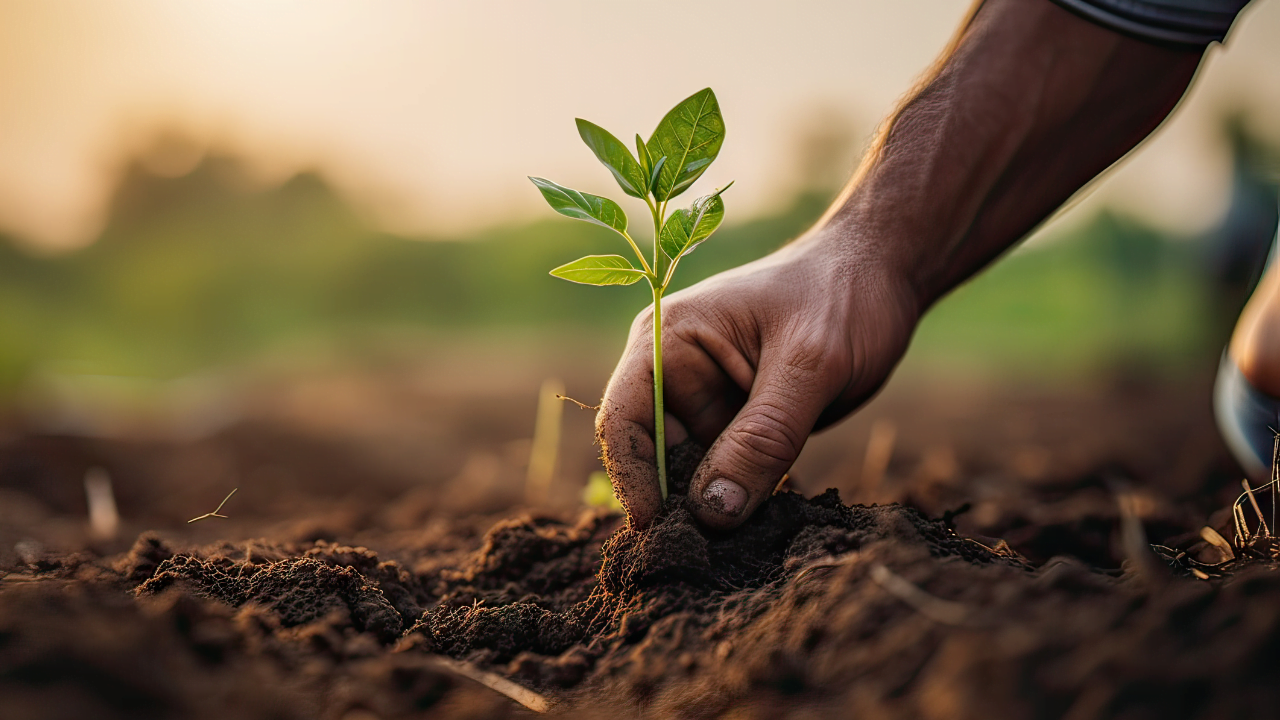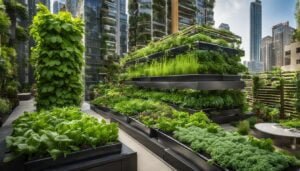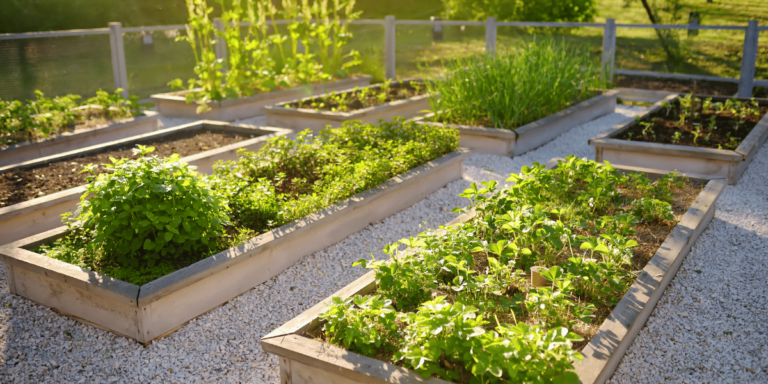Welcome to the world of tech-enhanced gardening, where tradition meets innovation to create sustainable and eco-friendly urban landscapes. This exciting approach combines the wisdom of traditional farming practices with cutting-edge technologies, paving the way for a greener and more resilient future.
In sustainable urban gardening, tech-enhanced gardening takes center stage, offering a holistic approach that focuses on partnerships between farmers, researchers, and technology providers. This collaboration promotes knowledge sharing and the adoption of innovative solutions, ensuring the widespread implementation of sustainable and eco-friendly landscape design.
Key Takeaways:
- Tech-enhanced gardening combines traditional wisdom with modern technologies for sustainable agricultural practices.
- Partnerships between farmers, researchers, and technology providers drive innovation in gardening.
- Natural farming and renewable energy integration improve soil health, water-use efficiency, and reduce environmental impact.
- Embracing tech-enhanced gardening leads to more sustainable and efficient urban green spaces.
Driving the Paradigm Shift: Technologies and Innovations in Agriculture
In the world of tech-enhanced gardening, the Fusion Approach revolutionizes traditional agricultural practices through cutting-edge technologies and innovative solutions. This approach encourages farmers to embrace the latest advancements to achieve sustainable and efficient agricultural operations.
One such technological marvel is the Fasal system. Powered by artificial intelligence (AI), this platform combines sensors, machine learning, and data analytics to provide real-time insights into crucial aspects of farming. Farmers can monitor crop health, water usage, and environmental conditions with precision, allowing them to make data-driven decisions and optimize resource allocation.
With the Fasal system, farmers can significantly reduce water consumption while increasing crop yields. The real-time data enables them to fine-tune irrigation practices, implement innovative water conservation techniques, and ensure the efficient use of this precious resource. This not only benefits farm productivity but also minimizes the environmental impact of agricultural activities.
Beyond water conservation, the Fusion Approach also emphasizes the integration of renewable energy sources, such as solar power, within eco-gardens. By harnessing the sun’s energy, farmers can achieve energy efficiency and reduce their carbon footprint. Renewable energy in eco-gardens not only powers various agricultural operations but also creates a sustainable and self-sufficient ecosystem.
The adoption of these technologies and innovations propels the paradigm shift in agriculture, enabling farmers to achieve remarkable results in terms of efficiency, productivity, and sustainability.
The Fasal System in Action
Let’s take a closer look at how the Fasal system enhances agricultural activities:
| Benefits of the Fasal System: | Description |
|---|---|
| Real-time crop health monitoring | The Fasal system continuously tracks crop health indicators, such as nitrogen levels, moisture content, and disease susceptibility. Farmers receive instant alerts regarding any anomalies, enabling timely interventions. |
| Precision water management | Through data analytics, the Fasal system determines accurate irrigation requirements based on crop needs, weather conditions, and soil moisture levels. This ensures optimal water usage, minimizing waste and maximizing efficiency. |
| Environmental conditions tracking | The Fasal system constantly monitors factors like temperature, humidity, and sunlight levels. This allows farmers to adapt their farming practices to create the ideal environment for their crops, promoting healthy growth and higher yields. |
The image above showcases innovative water conservation techniques in action, illustrating how technology can intelligently manage irrigation needs while minimizing water wastage.
Promoting Sustainability and Resilience in Agriculture

The Fusion Approach in tech-enhanced gardening prioritizes sustainable and resilient agricultural practices. By incorporating natural farming and organic composting methods, this approach aims to rejuvenate soil health, enhance water-use efficiency, and foster organic and sustainable food production.
Natural farming, a key component of the Fusion Approach, focuses on the use of organic fertilizers, pest management solutions, and soil health restoration techniques. By eschewing synthetic fertilizers and pesticides, farmers can reduce chemical runoff, minimize soil degradation, and promote biodiversity.
One of the fundamental principles of natural farming is the use of organic compost. Composting methods play a crucial role in supporting soil fertility and sustainability. By recycling organic waste materials like food scraps, yard trimmings, and animal manure, farmers can create nutrient-rich compost rich in beneficial microorganisms that nourish the soil and enhance plant growth.
The benefits of natural farming and organic composting methods go beyond soil health. These practices contribute to the reduction of greenhouse gas emissions, conserve water resources, and minimize the impact on the environment. Additionally, organic farming methods promote the production of healthy, chemical-free crops, thereby enhancing human health and well-being.
Advantages of Natural Farming and Organic Composting:
- Improved soil structure and fertility
- Enhanced water-use efficiency
- Minimized chemical runoff and soil degradation
- Promotion of biodiversity and environmental conservation
- Reduction of greenhouse gas emissions
- Production of healthy, chemical-free crops
Sample Table: Comparing Organic and Synthetic Fertilizers
| Aspect | Organic Fertilizers | Synthetic Fertilizers |
|---|---|---|
| Nutrient Content | Varies depending on the source, but often lower in nutrient concentration | Higher in nutrient concentration, standardized |
| Release Rate | Slow-release over time | Rapid-release, immediate nutrient availability |
| Environmental Impact | Minimal to no negative impact, reduced pollution and chemical runoff | Potential for pollution and water contamination due to excess nutrient leaching |
| Soil Health | Improves soil fertility, biological activity, and long-term soil structure | May lead to nutrient imbalances, decreased soil microbial diversity |
By adopting natural farming techniques and embracing organic composting methods, farmers can promote sustainability, resilience, and environmental stewardship. These practices not only benefit the soil, water resources, and biodiversity but also contribute to the production of healthier, more nutritious food for consumers.
Embracing the Fusion Approach: Unlocking Transformative Possibilities
Adopting the Fusion Approach in tech-enhanced gardening offers transformative possibilities for farmers. This approach involves reviving traditional crops through regenerative agriculture practices, which restore soil health, improve crop resilience, and mitigate the effects of climate change.
The Fusion Approach also empowers farmers with innovative tools and digital technology, such as AI-powered platforms, sensor-based systems, and indoor hydroponic systems. These technologies enhance farmers’ decision-making processes, optimize resource allocation, and improve agricultural practices.
Reviving Traditional Crops
One of the key aspects of the Fusion Approach is the revival of traditional crops. By harnessing regenerative agriculture practices, farmers can breathe new life into crops that were once forgotten or overshadowed by modern industrial farming methods. This not only enhances biodiversity but also preserves the cultural and agricultural heritage of specific regions.
Indoor Hydroponic Systems
Indoor hydroponic systems are a prime example of the innovative technology that the Fusion Approach offers. These systems allow farmers to grow crops in a controlled environment without soil, using nutrient-rich water solutions. By eliminating soil-based challenges such as pests, diseases, and limited growing seasons, indoor hydroponic systems enable year-round cultivation and maximize crop productivity.
The Fusion Approach, coupled with the integration of indoor hydroponic systems, revolutionizes traditional farming methods by providing a sustainable and efficient solution to grow crops. Farmers can optimize space utilization, reduce water and resource consumption, and ensure consistent crop yields.
Paving the Way for a Sustainable Future in Agriculture

The Fusion Approach in tech-enhanced gardening paves the way for a sustainable future in agriculture. It encourages the integration of green roof ecosystems and embraces biophilic design principles in landscaping. These practices contribute to environmental sustainability, biodiversity, and the overall well-being of farming communities.
Green Roof Ecosystems
One of the key aspects of the Fusion Approach is the integration of green roof ecosystems. Green roofs utilize roof spaces for cultivating an array of plants, ranging from ornamentals to food crops. Apart from the aesthetic appeal, green roofs provide numerous environmental benefits. They help reduce the urban heat island effect by improving thermal insulation, reduce stormwater runoff, and improve air quality by capturing pollutants. Additionally, green roofs create wildlife habitats, supporting local biodiversity.
Biophilic Design Principles
The Fusion Approach also emphasizes the incorporation of biophilic design principles in landscaping. Biophilic design aims to create spaces that foster a connection between humans and the natural environment. By using natural elements such as vegetation, water features, and natural materials, biophilic design promotes a sense of well-being and tranquility. Studies have shown that exposure to nature and biophilic elements can reduce stress, enhance cognitive function, and improve overall mental and physical health.
By integrating green roof ecosystems and embracing biophilic design principles, the Fusion Approach in tech-enhanced gardening not only contributes to environmental sustainability but also creates visually appealing and healthy spaces for farming communities to thrive.
AI and Machine Learning: Revolutionizing Crop Management
In the realm of tech-enhanced gardening, the implementation of AI and machine learning technologies has spearheaded a significant revolution in crop management. These cutting-edge technologies have the unrivaled ability to process vast amounts of data, offering valuable insights that facilitate efficient and precise agricultural practices. By harnessing the power of AI and machine learning, farmers can optimize resource usage, minimize waste, and ultimately achieve greater crop yields.
AI systems play a pivotal role in crop management by analyzing various factors such as weather patterns, soil conditions, and crop health. By closely monitoring and analyzing these parameters, AI systems can accurately predict yield outcomes, allowing farmers to make informed decisions about resource allocation and management. This optimization not only maximizes the productivity of the agricultural system but also minimizes resource waste, fostering sustainable and eco-friendly practices.
Another remarkable application of machine learning in crop management lies in automation. Machine learning algorithms can be trained to perform specific tasks, such as planting seeds or removing weeds, with remarkable precision and efficiency. By automating these labor-intensive activities, farmers can save significant amounts of time, reduce the likelihood of human errors, and streamline their operations.
The Benefits of AI and Machine Learning in Tech-Enhanced Gardening
- High-Tech Smart Gardening: The integration of AI and machine learning technologies in gardening paves the way for high-tech smart gardening practices. These innovative approaches leverage advanced algorithms and automation to improve efficiency, reduce waste, and promote sustainable and eco-friendly agricultural practices.
- Smart Garden Automation: Through the power of machine learning, automation is revolutionizing agricultural practices. Smart garden automation streamlines processes, lowers labor requirements, and enhances precision, allowing farmers to achieve better results with less effort.
In conclusion, the integration of AI and machine learning in tech-enhanced gardening has brought about a significant transformation in crop management. The analytical capabilities of AI systems, coupled with the automation provided by machine learning algorithms, empower farmers to make data-driven decisions and optimize resource allocation. This revolution in crop management not only increases productivity but also fosters sustainable and efficient agricultural practices, ushering in a new era of high-tech smart gardening and smart garden automation.
Conclusion
Tech-enhanced gardening is revolutionizing the future of agriculture by blending traditional practices with innovative technologies. By embracing sustainable and resilient techniques such as natural farming, renewable energy integration, and precision agriculture, tech-enhanced gardening offers transformative solutions for a greener and more efficient future.
The adoption of high-tech solutions like AI and machine learning enhances crop management and resource efficiency. Farmers can make data-driven decisions, optimize resource allocation, and increase crop yields while reducing environmental impact. The integration of eco-friendly garden renovation practices further promotes sustainability and the well-being of farming communities.
Tech-enhanced gardening allows for a more sustainable and efficient approach to urban green spaces, creating eco-friendly environments that benefit both people and the planet. By combining the wisdom of the past with the innovation of today, we can contribute to a greener future by embracing tech-enhanced gardening in our agricultural practices.
FAQ
What is tech-enhanced gardening?
Tech-enhanced gardening combines traditional wisdom with modern technologies and innovations to create sustainable and resilient agricultural practices. It emphasizes partnerships between farmers, researchers, and technology providers, promoting knowledge sharing and the adoption of innovative solutions.
How does tech-enhanced gardening promote sustainability?
Tech-enhanced gardening boosts soil health, enhances water-use efficiency, and reduces environmental impact. By incorporating natural farming and renewable energy integration, it prioritizes sustainable and resilient agricultural practices.
What are some examples of technologies used in tech-enhanced gardening?
One example is the Fasal system, an AI-powered platform that combines sensors, machine learning, and data analytics to provide real-time insights into crop health, water usage, and environmental conditions. Other technologies include sensor-based systems, indoor hydroponic systems, and smart garden automation.
How does tech-enhanced gardening contribute to environmental sustainability?
Tech-enhanced gardening promotes eco-friendly garden renovation practices, such as the integration of green roof ecosystems and the use of biophilic design principles. These practices help reduce the carbon footprint, enhance biodiversity, and improve the overall well-being of farming communities.
What role do AI and machine learning play in tech-enhanced gardening?
AI and machine learning technologies revolutionize crop management in tech-enhanced gardening. They process vast amounts of data to provide valuable insights for efficient and precise agricultural practices. These technologies analyze weather patterns, soil conditions, and crop health, optimizing resource usage and minimizing waste.
How does tech-enhanced gardening support sustainable urban gardening?
Tech-enhanced gardening incorporates space-efficient vertical gardening techniques and encourages the adoption of indoor hydroponic systems. These practices enable sustainable food production in urban environments with limited space, promoting access to fresh produce and reducing food transportation emissions.
Can tech-enhanced gardening be applied to existing gardens?
Yes, tech-enhanced gardening can be applied to existing gardens through eco-friendly garden renovation practices. This includes the integration of innovative water conservation techniques, renewable energy sources, and the adoption of organic composting methods to improve soil health and reduce environmental impact.










